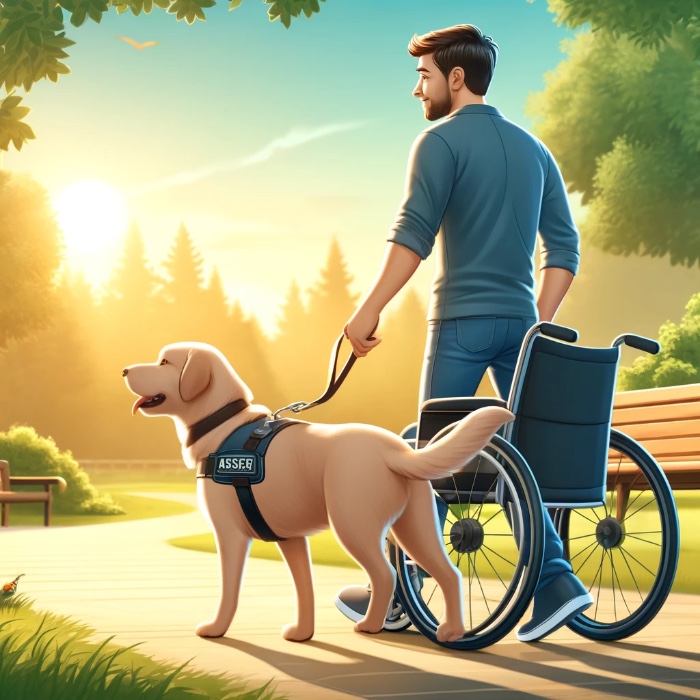Every day hundreds of people ask us a PIP question. A PIP question can be about how the benefit works, where to find the claim form, or about an aid or appliance.
We have gathered together the most commonly asked PIP questions we get asked and our answers. But, even if you see your question answered here, still use our live question and answer service because we can give you a personalised answer specific to your circumstances and this is likely to be more helpful.
Q: Is PIP means tested?
No. Personal Independence Payment awards are not affected by savings or earnings. You will not have to declare savings, income or other monies on your pip form.
However, receiving PIP can have an impact on other means-tested benefits and tax credits. Here's how PIP interacts with these financial supports:
Means-Tested Benefits
Means-tested benefits are those that take your income and savings into account when determining eligibility and the amount you receive. Receiving PIP can affect your entitlement to the following means-tested benefits:
- Universal Credit (UC):If you receive PIP, it can increase the amount of Universal Credit you are entitled to. PIP is not counted as income for UC purposes, and you may be eligible for additional elements, such as the limited capability for work and work-related activity element.
- Housing Benefit: PIP can lead to higher rates of Housing Benefit, as it indicates a higher level of need. Housing Benefit does not consider PIP as income, and you may qualify for additional premiums that increase your benefit amount.
- Income Support: If you are receiving Income Support, getting PIP can entitle you to extra premiums, increasing your overall benefit amount.
- Employment and Support Allowance (ESA): Similar to Income Support, PIP can lead to additional premiums in ESA, especially if you are in the support group.
- Council Tax Reduction: Many local authorities offer a reduction in council tax for those receiving PIP. The exact amount varies by council, but it can significantly lower your council tax bill.
Q: What age can I claim PIP?
From 16 to pensionable age. Everyone has a different state pension age. You can find out when you reach the state pension age with your National insurance number on the .gov website.
You can apply for Personal Independence Payment (PIP) if you are below the state pension age at the time of your application. This means that you must be under the state pension age on the date your application (pip form) is received by the Department for Work and Pensions (DWP).
Q: Can I work and claim PIP at the same time?
Yes but the work you do must not conflict with the reasons you get PIP. For example it would be wrong to claim for issues preparing a meal but to work as a chef.
Q: Can I get a Blue Badge with PIP?
Yes if you receive a Personal Independence Payment (PIP) because you can’t walk more than 50 metres (a score of 8 points or more under the ‘moving around’ activity of the mobility component) or you receive the mobility component of PIP and have obtained 10 points specifically for descriptor E under the ‘planning and following journeys’ activity, on the grounds that you are unable to undertake any journey because it would cause you overwhelming psychological distress.
If you have any score other than 10 points under descriptor E, in the ‘planning and following journeys’ activity of PIP you may still be eligible for a Blue Badge, but you do not automatically qualify. This includes if you have a higher score of 12. You will have to provide evidence to demonstrate your eligibility which will be assessed as part of your application.
Q: Can I get a mobility car?
Yes, if you are in receipt of the Enhanced Rate of the Mobility Component of PIP you are eligible to lease a vehicle on the Motability Scheme.
Q: Can I get help with road tax?
You can apply for exemption from paying vehicle tax if you get the enhanced rate mobility component of Personal Independence Payment (PIP). The vehicle must be registered in the disabled person’s name or their nominated driver’s name. It must only be used for the disabled person’s personal needs. It cannot be used by the nominated driver for their own personal use. You can only have one vehicle tax exemption at any one time.
You can get a 50% reduction in vehicle tax if you get the PIP standard rate mobility component. Again, the vehicle should be registered in the disabled person’s name or their nominated driver’s name.
Q: I’ve too much in savings, can I claim PIP?
PIP is not means tested so you can claim it even if you are a millionaire.
Q: I’m too old, does PIP stop when I become a pensioner?
You have to claim before you reach pensionable age. It does not stop once you reach this age unless the award is reviewed and removed.
Q: What is the Daily Living component?
The Daily living component is used to determine your PIP award. The Daily living component is awarded if your disability affects you such that you need help more than half of the time with everyday tasks like:
- preparing food, eating,
- cook a simple meal,
- manage medication,
- washing, bathing and using the toilet,
- dressing and undressing,
- reading and communicating,
- understand basic verbal information,
- understand basic written information,
- understand complex verbal information,
- understand complex written information,
- managing your medicines or treatments,
- making decisions about money,
- engaging with other people,
- complex budgeting decisions,
- understanding signs,
- understand verbal information unaided,
- manage incontinence,
- toilet needs or incontinence,
Q: What is meant by Aid or Appliance?
An aid or appliance in relation to PIP refers to any device or equipment that helps an individual carry out daily living activities or mobility tasks. These aids or appliances are essential for those who have physical or mental health conditions that affect their ability to perform these tasks independently.
Examples of aids and appliances include, but are not limited to:
- Orientation Aid: An orientation aid is a tool designed to assist individuals in navigating their environment safely. Examples include white canes for visually impaired individuals, specialized software for those with cognitive impairments, or electronic devices that provide audio directions.
- Assistance Dog: An assistance dog can help individuals with disabilities perform specific tasks. For example, guide dogs help visually impaired people navigate their surroundings, while hearing dogs alert deaf individuals to important sounds like doorbells or alarms.
- Mobility Aids: These include wheelchairs, walking frames, crutches, and other devices that help individuals move around more easily. They are crucial for those with mobility impairments to maintain independence.
- Communication Devices: Tools that assist individuals with speech or hearing impairments in communicating effectively. These can include hearing aids, speech-generating devices, and specialized software applications.
- Medical Equipment: This encompasses a wide range of devices, such as nebulizers, glucose monitors, or home dialysis machines, which are necessary for managing chronic health conditions. You can also ask a health professional to give you more information about the aid or appliance you are using.
- Adapted Household Items: Everyday items that have been modified to make them easier to use for people with disabilities. Examples include kitchen utensils with special grips, electric can openers, or adjustable-height beds.
Your aid or appliance is considered by the PIP assessment process to determine the level of support you need. The use of your aid or appliance can impact the points awarded in various components of the PIP assessment, influencing the overall entitlement and the rate of PIP received.
Understanding what qualifies as an aid or appliance is crucial for applicants, as it ensures they accurately report the tools they rely on in their daily lives, which in turn affects their assessment and eligibility for PIP.
When you are completing the pip form, you need to describe the aid or appliance and how it helps relieve or manage what your disability affects.

Q: What is meant by Cook a simple meal?
Defining 'cook a simple meal' can be subjective, as what constitutes a simple meal can vary widely from one person to another. However, in the context of PIP, to 'cook a simple meal' refers to the ability to prepare and cook a simple meal for one person from fresh ingredients.
Key points to consider for your pip claim form include:
- Preparation: This involves tasks such as peeling, chopping, and slicing ingredients. For some, using a knife safely may require significant dexterity and strength.
- Cooking: This covers the actual cooking process, whether it be boiling, frying, grilling, or baking. It also includes the ability to manage the heat and timing required to cook the food properly.
- Safety Awareness: This is a critical aspect and includes understanding and managing the risks associated with using kitchen appliances, handling hot surfaces, and avoiding cross-contamination of food.
- Cognitive Abilities: Preparing a meal also involves planning and sequencing tasks, which requires a certain level of cognitive function. This includes following a recipe, timing different steps, and managing multiple tasks simultaneously.
- Physical Capability: This refers to the physical ability to stand for the duration needed to cook, to lift and carry ingredients, pots, and pans, and to manipulate kitchen tools effectively.
- Independence: To be considered able to 'cook a simple meal unaided', an individual should be able to perform these tasks without assistance from another person. However, using aids and appliances like adapted kitchen tools or perching stools is taken into account, as these are designed to support independence.
Examples of 'cook a simple meal' might include:
- Pasta with Sauce: Boiling pasta and heating a ready-made sauce.
- Omelette: Beating eggs, chopping and adding ingredients like cheese or vegetables, and cooking it on a stovetop.
- Grilled Cheese Sandwich: Assembling the sandwich and grilling it until the cheese is melted.
Assessors look at an individual's ability to cook a simple meal unaided, reliably, repeatedly, safely, and in a timely manner.
If someone requires assistance to complete these tasks, whether due to physical, sensory, cognitive, or psychological impairments, this is taken into account in their PIP assessment so make sure you include detailed information on your pip form.
Understanding what 'cooking a simple meal' entails helps applicants accurately describe their abilities and challenges, ensuring that the PIP assessment reflects their true level of independence and need for support.

Q: Can I claim PIP for a mental health condition?
Yes, you can claim PIP for a mental health condition. PIP is designed to provide financial support to individuals who have difficulties with daily living or mobility due to a physical or mental health condition. If your mental health condition makes your ability to carry out daily activities or move around more difficult, you may be eligible for PIP.
Key Areas Considered for PIP:
- Avoid Overwhelming Psychological Distress: PIP takes into account whether you need help or have difficulty engaging with other people due to overwhelming psychological distress. This could include situations where you avoid social interactions or public places because of anxiety, depression, or other mental health conditions.
- Managing Therapy: If you require support in managing therapy or medication, this is also considered. Managing therapy includes remembering to take medication, attending therapy sessions, and following treatment plans, which can be challenging for individuals with mental health conditions.
- Effect on Daily Living and Mobility: The assessment looks at how your condition affects your daily living activities, such as preparing food, washing, dressing, or making complex budgeting decisions. For instance, if your condition makes it difficult to budget money or pay bills, this will be taken into account.
- Complex Budgeting Decisions: PIP considers whether you need assistance with managing finances, especially complex budgeting decisions. If your mental health condition impacts your ability to handle money, make financial plans, or pay bills on time, this will be relevant to your claim.
- Other Mental Health Conditions: It's important to note that PIP assessments consider the cumulative effect of all your health conditions. If you have more than one mental health condition, or if you have a mental health condition along with a physical condition, the combined impact on your daily living and mobility will be evaluated.
Application Process:
When applying for PIP using the PIP claim form, it’s essential to provide detailed information about how your mental health condition affects your daily life. Include any medical reports, letters from healthcare providers, and personal statements that explain your difficulties. This will help ensure the assessor understands the full extent of your needs.
PIP aims to support those who face significant challenges due to their health conditions, and mental health conditions are given the same consideration as physical ones. By accurately detailing your experiences and difficulties, you can make a strong case for your PIP claim.
